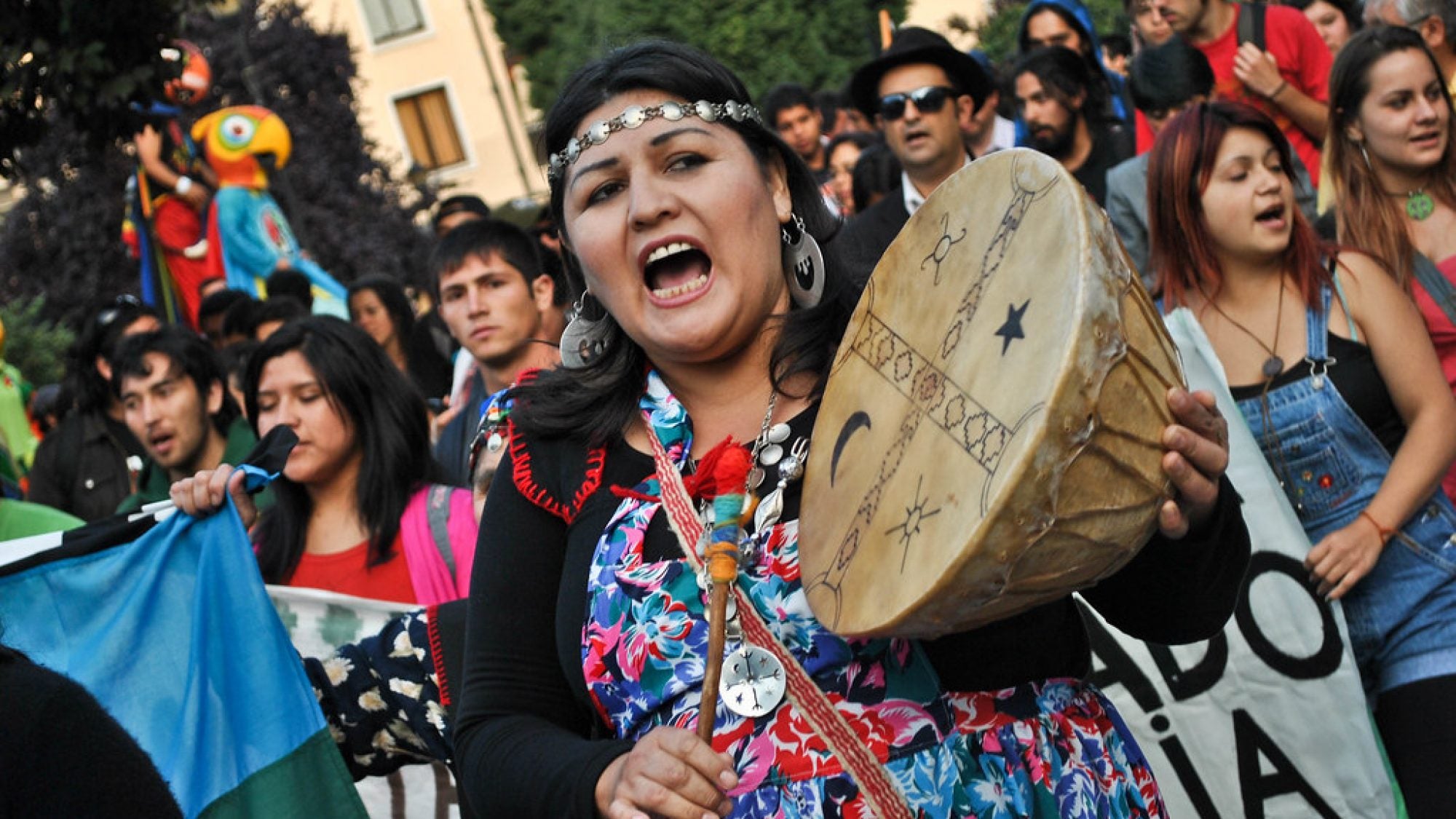
Title: Mapuche Movements in Chile: From Resistance to Political Recognition
The Mapuche movements in Chile have had an important role in recent decades, pressing for changes to the nation-state model that will allow recognition of their rights of self-determination and autonomy. This article describes the main movements and their demands in the ongoing constitutional process. A plurinational state, the recognition of self-determination and autonomy, and the restitution of their ancestral lands are at the core of the Mapuche’s demands.
Introduction
Since the creation of nation-states, indigenous peoples have been forced to assume roles assigned to them by Western society. However, in the last decades, indigenous movements have garnered attention for questioning this nation-state model [1]. Among the most relevant cases has been the Mapuche indigenous movements in Chile, which seek to advance the recognition of the Mapuche’s rights as pre-existing nations.
Indigenous groups form an integral part of the Chilean population. According to Chile’s 2017 census, 12.8 percent of Chileans declared themselves belonging to an ethnic group, totaling 2,185,192 indigenous people. The Mapuche people make up the majority of indigenous people, comprising 79.8 percent. Despite their large representation of the total population, the CASEN 2015 survey shows the gaps that still persist between the indigenous and non-indigenous populations in access to higher education, use and knowledge of their language, and poverty, among others. As CASEN 2017 points out, the La Araucanía region has the highest poverty rate in Chile, reaching 17.2 percent, double the national rate.
As in other Latin American countries, Chile follows a nation-state model which denies the legitimacy of the pre-existing nations made up of the indigenous peoples. This has given rise to a state and society ignorant of indigenous peoples, constructing an ideal of a homogenous nation where the “egalitarian” citizenry shares the same aspirations. This narrative fails to recognize the political rights of indigenous peoples and obscures their demands.
To understand the conflict between the Chilean state and indigenous peoples—the Mapuche peoples in particular—one must understand how the Chilean state was constructed. During this construction, the Chilean state established institutions in indigenous territories mainly through force. The idea of “one nation” served as support for the homogenization of systems of political representation, but also for the use and occupation of public and power spaces, excluding the Mapuche peoples from institutional configuration and establishing a policy of territorial dispossession.
This nation-state model has resulted in many Mapuche movements in Chile, which this article will explore while identifying the elements that have influenced their emergence, their dynamics with the nation-state, and their strategies for achieving their goals. In light of the current constitutional process in Chile, this article also details the policy changes the movements seek to implement.
The Mapuche Movements: Demands, Strategies, and Proposals
The Mapuche movements in Chile emerged strongly in the 1990s, influenced by other movements in Latin America but also by internal situations that occurred in the country once democracy returned. One of these events was the promises contained in the so-called “New Imperial Pact,” where the new democratic government formalized the commitment to advance in the recognition of rights to indigenous peoples with a specific law, promulgated in 1993, called “The Indigenous Law.” However, this law was limited in several ways, recognizing indigenous peoples as “ethnic groups” instead of nations and failing to attend to their territorial demands. This law adopts a narrow perspective about property and the rights of indigenous peoples to ancestral territorial restitution, deepening the conflict between the state, companies installed in disputed territories, and Mapuche communities. One of the most important issues has been the promotion of private investment in indigenous territories (mainly Mapuche), intensifying the territorial dispossession and desertification of ancestral lands. Most of the lands claimed by Mapuche communities are currently owned by forestry companies, which hold more than 280 thousand hectares of the 435 thousand hectares that exist in the region. According to its own reports, one single company, the CMPC holding company, owns 170 thousand hectares in this region.
In response to these conditions, one of the Mapuche movements that originated in the 1990s was Aukin Ngulam Wallmapu, or “Council of All Lands.” The movement promotes an ideological discourse based on self-determination, demanding of the state an agenda that includes a Mapuche flag, a passport and identity card specific to Mapuche People, and constitutional recognition [2]. Founded in 1990, this organization has become a key figure within the indigenous movements of the time. Among their proposals is the achievement of territorial political autonomy for the Mapuche people, which means owning, controlling, and managing their territory and shaping a new institutional framework based on Mapuche participation and autonomy. The movement employed roadblocks, occupation by force of disputed lands, and a greater presence in international organizations through the complaint [3].
Another important organization within the Mapuche movements in Chile is the Coordinadora Arauco-Malleco (CAM), created in 1998. This organization proposes the use of force and violence as the only strategy for territorial control and recovery of ancestral lands and promotes the self-determination of the Mapuche People [4]. Its main leader, Héctor Llaitul, calls for organization of the Mapuche communities and delegitimization of the Chilean state due to its colonial nature. In response, the Chilean state may further its conflict with indigenous groups via the “Anti-Terrorism Law” first promulgated during the military government in 1984. The law determines terrorist conduct and the penalties applied to those who are suspected of such conduct, even with little evidence. To some experts, a new relationship between indigenous communities and the state began with that law and continues to this day, during which internal security issues are cited to justify the excessive presence of law enforcement and public security forces in indigenous areas. As the state has grown increasingly oppressive, complaints about abuse of force by the Carabineros against Mapuche families have emerged.
In recent decades, new movements have emerged, including the “Mapuche Lavkenche Resistance” (RML). Launched in the Mapuche territory Cañete-Tirúa in 2018 following numerous called for resistance, the movement is based on the politics of Mapuche warriors and territorial control. The “Weichan Auka Mapu” organization in the Mapuche area was created in 2014 under similar conditions; their symbol is a kultrün crossed by a shotgun and a spear.
Beyond the movements that propose a disruptive path to self-determination, there are proposals that arise from organizations that look to achieve their goals in an institutional way, promoting changes to the Constitution and its political-institutional framework. Although there is a general agreement regarding the final objectives of the Mapuche movements, there are currently disagreements regarding the strategies best suited to advancing those results.
The Current Demands of Indigenous Movements in Chile
The current constitutional process opens an important path for advancement in the recognition of indigenous peoples. The demands and proposals that arise from the Mapuche movements are varied but typically include a territorial claim, environmental protection, self-determination, autonomy, and recognition of their social and cultural practices.
One of the Mapuche’s demands is the establishment of a plurinational state that recognizes different nations in indigenous territories, provides opportunities for political representation and allows for the construction of their own social and political institutions. This does not imply the supremacy of one nation over another but rather the search for new forms of participation based on respect and equity.
Plurinationality also allows the exercise of the rights of self-determination and autonomy. In accordance with the United Nations Declaration on Indigenous Peoples, states must create institutional adjustments so that these peoples can freely establish their political status and pursue their economic, social, and cultural development. Likewise, states must also respect indigenous rights to promote, develop, and maintain their institutional structures and their own culture, spirituality, traditions, procedures, practices, and, where they exist, customs or legal systems. For the Mapuche movements, constitutional recognition of a plurinational state with territorial and non-territorial autonomy would allow for the recognition of the rights of indigenous peoples. Thus, it is important that the new Constitution establishes the right of indigenous peoples to resolve their own affairs and regulate the fundamental aspects required for the pursuance of their ways of life.
Conclusions
The process of constitutional change in Chile is a historic opportunity for the advancement of the rights defended by Mapuche movements and for the emergence of new citizenships—culturally differentiated and based on the right to self-determination.
This opportunity also allows participants and onlookers to question concepts and practices related to democracy itself: the exercise of citizenship, the valuation of equality and individualism over equity, and the recognition of the collective, among other aspects. Chile can begin to walk the path towards interculturality and coexistence based on the recognition of indigenous peoples.
. . .
Verónica Figueroa Huencho is a Mapuche professor who received her Ph.D. in Management Sciences from ESADE-Ramón Llull University. She is a postdoctoral fellow at the Center for Latin American Studies at Stanford University, an associate professor at the Institute of Public Affairs at the University of Chile, and a Visiting Scholar at David Rockefeller Center for Latin American Studies at Harvard University (2020).
1. Yvon Le Bot, La gran revuelta indígena (Spain: Universidad Iberoamericana Puebla, 2013).
2. Fernando Pairican Padilla, Malon: la rebelión del movimiento mapuche, 1990-2013 (Santiago: Pehuén, 2014).
3. Verónica Figueroa Huencho, Formulación de políticas públicas indígenas en Chile (Santiago: Editorial Universitaria, 2014).
4. Fernado Pairicán and Rolando Álvarez, “La Nueva Guerra de Arauco: La Coordinadora Arauco Malleco en el Chile de la Concertación de Partidos por la Democracia (1997- 2009),” Revista Izquierdas 10 (2011): 66–84, https://www.redalyc.org/pdf/3601/360133450004.pdf
Image Credit: Esteban Ignacio (via Creative Commons)
Recommended Articles

An estimated 7.9 million Venezuelans migrated abroad for the long term under President Nicolás Maduro’s rule as Venezuela’s political, economic, and social crises have deepened. Alongside rising Venezuelan migration, migrants…

Amid stalled U.S. federal climate engagement and intensifying transatlantic climate risks, subnational diplomacy has emerged as a resilient avenue for cooperation. This article proposes a Transatlantic Subnational Resilience Framework (TSRF)…

The 1997 hijab ban in Türkiye left lasting effects on Muslim women’s psychological, social, and religious identities, shaping their experiences across academia, bureaucracy, and politics. Evidence from interviews…